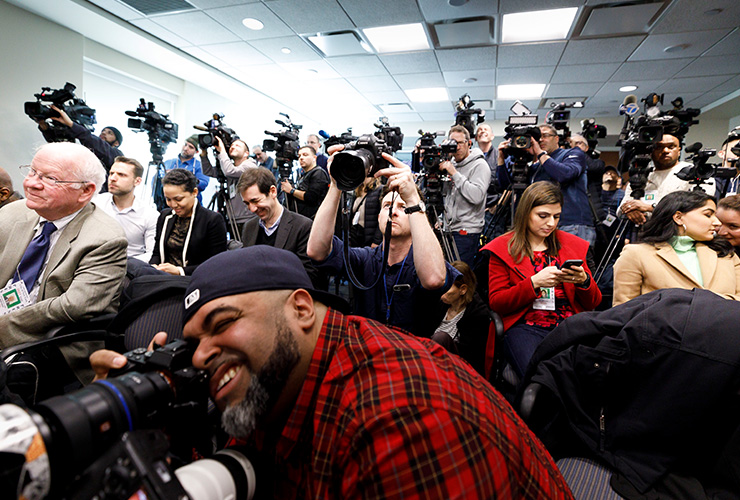Politics this week-
The FBI waded into the American presidential election by rebooting its investigation into Hillary Clinton’s use of a private e-mail server while secretary of state, four months after exonerating her. The bureau’s director, James Comey, faced fierce criticism for being vague about the new probe. The news was the latest “October surprise” to shake up a race between Mrs. Clinton and Donald Trump that has tightened in its final days. See blog.
Two police officers were shot dead while sitting in their cars in Des Moines, Iowa. Local authorities later arrested a 46-year-old man suspected of carrying out the “ambush-style” attacks.
America’s longest sporting drought ended when the Chicago Cubs won the World Series. They defeated the Cleveland Indians 8-7 in Game Seven of the Major League Baseball finals after enduring more than a century without winning a trophy.

Venezuela’s leftist government and the opposition began talks mediated by the Vatican. Tensions between the two sides increased after the government blocked a referendum to recall Nicolás Maduro’s president. The negotiations will cover restoring the rule of law, the schedule for elections, human rights, and the economic crisis. See article.
Police in El Salvador arrested a former president, Elías Antonio Saca, on suspicion of money laundering and embezzlement. Mr. Saca governed from 2004 until 2009 as a member of the conservative ARENA party. During his tenure, officials put nearly $250m of public money into private accounts, prosecutors say.
Marcelo Crivella, a Pentecostal bishop, was elected mayor of Rio de Janeiro, Brazil’s second-most-populous city. He has promised to continue providing public financing for the city’s gay-pride parade and samba schools. See article.
Trouble brewing
China’s legislature, the National People’s Congress (NPC), was reportedly preparing to intervene in a row in Hong Kong over whether two legislators who support greater autonomy for the territory should be allowed to take up their posts. The politicians used derogatory language about China when they were sworn in. A court in Hong Kong began hearing a case filed by the local government apparently aimed at blocking them, but the NPC wants to move faster. See article.
A gas explosion at a privately owned coal mine in Chongqing’s southwestern region killed 33 workers trapped underground. Two miners survived the blast.
China allowed Philippine vessels to fish near Scarborough Shoal, a disputed tidal atoll. China’s navy had been chasing them away but seemed to have halted after overtures from the Philippines’ new president, Rodrigo Duterte. See article.
Prosecutors detained Choi Soon-soil, a South Korean woman accused of exploiting her friendship with the president, Park Guen-Hye, to raise money for foundations she controlled and meddle in government affairs. Ms. Park appointed a new prime minister, reshuffled her cabinet, and dismissed ten close aides in response to the scandal. See article.
Thai authorities announced that Crown Prince Maha Vajiralongkorn would assume the throne on December 1st, after his father, King Bhumibol, in October. The prince had initially demurred out of respect for the late king.
Cease
Iraqi troops moved into an outlying district of Mosul, which the Islamic State has held since 2014. But the battle for the city has been running for two weeks, and progress is slow. See article.
Michel Aoun, a Maronite Christian, and former warlord, became president of Lebanon, ending an impasse that lasted two-and-a-half years. See article.
Syrian rebels launched an offensive to try to break the siege of Aleppo. But an escalation of the bombing there is expected within days as a Russian aircraft carrier nears the eastern Mediterranean.
South African prosecutors withdrew flimsy charges of fraud brought against the finance minister, Pravin Gordhan. The politically motivated charges were part of a struggle between Mr. Gordhan and the president, Jacob Zuma. Separately, a report called for a judicial inquiry into corruption involving Mr. Zuma. See article.
Egypt said it would float its pound. The central bank announced a series of reforms designed to help secure a $12bn bail-out from the IMF. The currency had been trading well below the official rate on the black market.
The United Nations sacked the Kenyan head of a peacekeeping force in South Sudan after finding it had failed to respond to civilians’ attacks by South Sudanese forces. Kenya, in turn, said it would withdraw its troops from the force.
The genuine article
The British High Court ruled that the government does not have the right to invoke Article 50, the legal mechanism for triggering Brexit, without the approval of Parliament. The pound rose following the news. The verdict is a setback for Theresa May’s government, which said it would appeal. See article.
Geert Wilders, leader of the Party for Freedom, a populist Dutch group leading in the polls, failed to turn up for the first day of his trial for hate speech. Instead, Mr. Wilders took to Twitter to espouse more of the anti-Muslim views that had landed him in trouble.
READ MORE :
- Bangladesh Arrests Main Suspect In Secular Blogger Murder Case
- ‘Automatic tools help the welding industry grow.’
- Police hope blogger Nazim’s murderer will provide information on LGBT activist Xulhaz’s killers.
- Computer training changed the lives of disabled students
- Software launched for online registration of farmers
Germany’s EU commissioner, Günther Oettinger, apologized after a video showed him mocking Chinese people and decrying gay marriage. Germany’s Social Democrats criticized him, but Chancellor Angela Merkel, the leader of Mr. Oettinger’s Christian Democrat party, stayed mom.
Politicians in Ukraine backtracked on a pay rise that would have doubled their earnings, following public outrage after details of their property holdings were published. Some 50,000 officials had been required to declare their assets, including vintage wine, luxury watches, flashy cars, and a church.
Iceland’s center-right Independence Party came first in the country’s general election and was asked to form a coalition. The result was disappointing for the Pirate Party, which won just 14.5% of the vote despite polling at 40% earlier this year. See article.
Read Full Article

































